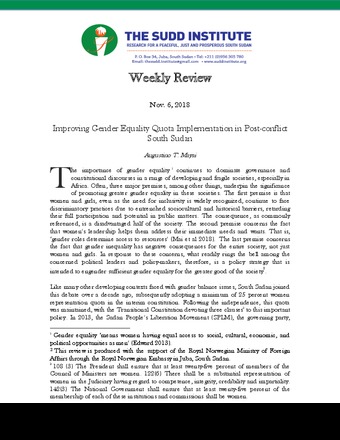Improving Gender Equality Quota Implementation in Post-conflict South Sudan
Publication Summary
In 2005, South Sudan adopted a minimum of 25 percent women representation quota in its interim constitution. Following the independence, this quota was maintained, with the Transitional Constitution devoting three clauses to this important policy. In 2013, the Sudan People’s Liberation Movement (SPLM), the governing party, proposed raising this quota to increase women’s participation in public life. In the recently signed peace agreement, known as the Revitalized Agreement on the Resolution of Conflict in South Sudan (R-ARCSS), this long propagated quota increase was implemented—stipulated as 35 percent. Article 1(1.12.2) and Article 5(1.1) of the R-ARCSS guarantee 35 percent participation of women in the Executive and in the Transitional Justice Institutions. Moreover, Article 1(1.4.4) states that the “[provisions] of the Transitional Constitution of the Republic of South Sudan and ARCSS on participation of women (35%) in the Executive shall be observed.”
To help foster a better understanding on how South Sudan has been grappling with the issue of gender inequality in the last few years, this weekly review highlights the experience of implementing pro-gender parity statutes and policies. After exploring the gaps between the ideals and practice, as far as the implementation is concerned, the review suggests what could be done to realize the fundamental objectives of these policy commitments, especially as the country moves to restore stability. Thus, of importance are strategies through which the newly introduced quota system, the 35 percent, can be implemented.
Augustino Ting Mayai's Biography
Augustino Ting Mayai is the former Managing Director of the Sudd Institute. He is a founding Research Director of the same institution, serving in this capacity for a decade. He holds a Ph.D. in Sociology, with concentrations on demography and development from the University of Wisconsin-Madison. He currently studies how state effectiveness affects child health outcomes in South Sudan and Ethiopia. Dr. Mayai has written extensively on South Sudan’s current affairs. August is the current Chair (Statistician General) of the National Bureau of Statistics, Government of South Sudan.

